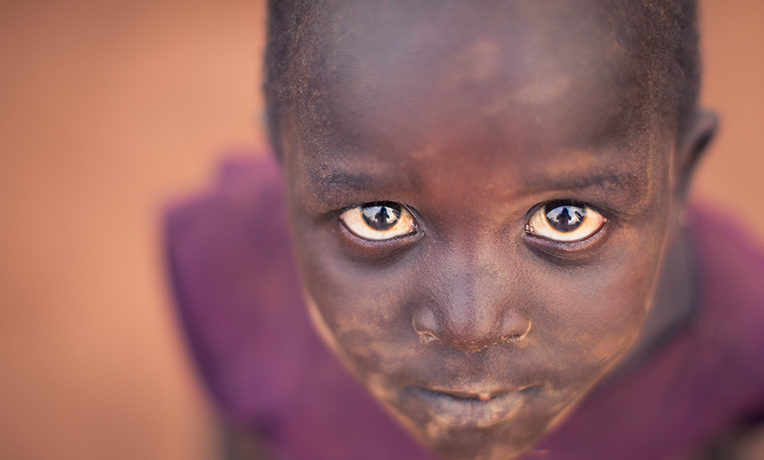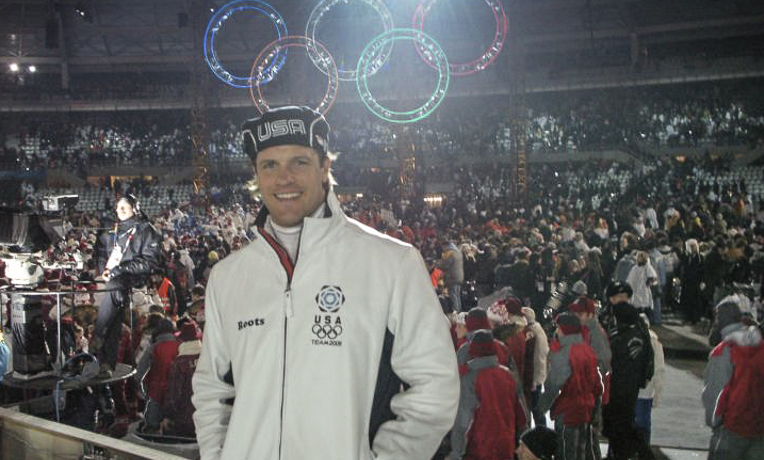As the bobsled event takes place at the Winter Games, a former Olympian and medal contender now working with Samaritan's Purse in South Sudan knows that helping in the name of Jesus Christ is the greatest event.
Brock Kreitzburg woke up the morning of December 16 to the sound of rapid gunfire and bombs exploding. He had heard some gunshots during the night, but this outburst of violence was unlike anything he had ever experienced before.
“I knew right away that these were different,” Brock said. “The shooting and explosions were more consistent, not at all sporadic.”
Deadly fighting had broken out in South Sudan’s capital city of Juba, a chilling reminder that peace in the world’s newest nation teetered on a slim margin for error.
That misstep may have come just months earlier when president Salva Kiir Mayardit fired former vice president Riek Machar and sent the entire cabinet packing. This perceived power grab resulted in an attempted coup, and a country that was birthed out of a 20-year civil war a little more than 2.5 years ago already finds itself on the brink of self-destruction.
Brock is the Samaritan’s Purse deputy country director at our office in Juba. He was covering for our country director who was on leave. His first concern was for staff members and their safety.
Over the next few hours he was firmly attached to his phone, texting and calling so he could account for everyone. International field staff was told to gather at our base. National staff was encouraged to stay home.
“We didn’t really know what was going on,” Brock said. “We were nervous about the crossfire and how bad the conflict was going to get.”
Before long it was obvious the uprising was not going to settle down. The levels of violence were making it impossible to continue all of our programs in South Sudan.
Brock worked with other senior leadership to organize the evacuation of 70 expatriate staff. Within a week after fighting first broke out, they were all safely relocated to our base in Nairobi, Kenya.
“We all struggled with leaving,” Brock said. “But we knew that temporarily relocating would give us a better idea of what was going on so we could re-enter more strategically. And we knew our national staff could keep our programs running without missing a beat.”
Brock had faced intense pressure before, but never like this and for very different reasons at a time that he says feels like a lifetime ago.
Olympic-Size Dreams
After graduating from the University of Toledo, Brock attended a mini camp with the Tampa Bay Buccaneers of the National Football League. He hoped to make the team as a wide receiver—the same position he played in college. He had also competed in track and field.
He wasn’t signed, so he enrolled at Gordon-Conwell Theological Seminary in Charlotte. But he missed competing. He began training at a nearby facility to try once again to break into the NFL.

Brock achieved his dreams of an athletic career when he came a world-class bobsledder.
As he chased his dream of making it as a pro football player, Brock ended up catching the eye of a team in a completely different sport.
The U.S. bobsled team was using the same training facility, and the coaches were interested in Brock’s rare combination of speed and strength, perfect skills for a push athlete on a sled.
“They were training with the same type of facility in Salt Lake City,” Brock said. “In Charlotte they did a four-month recruiting process, which produced me and two other team members.”
That was in the summer of 2001. Brock enjoyed being an athlete again, but he knew making the 2002 Olympic team was a long shot for such a newcomer to the sport. He took time off from training to return to seminary, where he graduated with a Masters of Divinity degree.
Brock had become a Christian after his father died from cancer 20 years earlier. This had caused an emptiness that he says he tried to fill by getting involved in many different activities in high school and college.
Athletics was one of those activities. He always dreamed of making it a career. Now, as he re-entered the world of bobsledding after graduating from seminary, he was on the verge of making that happen.
But his individual success was costing him a personal relationship with the Lord.
“At that point in my life my athletic goals were my top priority,” Brock admitted. “Everything was about me performing at my very best—diet, rest, exercise. There was little room for my relationship with God.”

U.S. bobsledders (l. to r.) Steve Mesler, Brock Kreitzburg, Todd Hayes, and Pavle Jovanovic.
Professionally, he was nearly at the top of his sport. After three years of training and competing, Brock and driver Todd Hayes were ranked second in the world.
The two had high expectations entering the 2006 Winter Olympics in Torino, Italy, where they were predicted to win a gold medal. Those dreams were quickly derailed as they struggled with their runs down the track and finished in seventh place.
After Hayes retired the following year, Steve Holcomb slid into the driver’s seat. This new pair sledded their way to the overall World Cup title in 2007 and finished the season as the top-ranked team in the world.
Brock did not know it then, but this would be the pinnacle of his bobsledding career.
“In 2008 I had to have hip surgery,” he said. “I thought it was no big deal.”
But there were complications during the operation, and just seven weeks after his first surgery Brock had to go under the knife once again.
“My doctor told me that if I didn’t have the second surgery I would be in a wheelchair by the time I was 30,” he said.
He spent the next 11 months rehabbing. And though he ended up making the national team again, Brock knew his athletic ability had significantly declined.
“I just wasn’t the same athlete I was before, which you never are after getting cut into,” he said.

God’s plan took Brock from being an Olympic athletic to helping people in South Sudan through Samaritan’s Purse
He failed to make the Olympic team for the Winter Games in Vancouver, Canada in 2010, and was forced to watch on TV as Steve Holcomb piloted the U.S. four-man sled to gold.
“It was a bittersweet moment watching my team win gold,” Brock admitted. “I was excited for them, but for me, it was tough.”
The end of his athletic hopes and dreams started him spiraling down a track of depression, where he would eventually hit an emotional rock bottom.
Brock spent the next year careening out of control. He eventually found himself rigging stunts on the set of a network television show. Though he was in Hollywood and making good money, he struggled to understand what he was supposed to do with his life now that he was no longer an athlete.
“I had no friends and my family was far way,” Brock said. “It was a real low point in my faith because I thought I had lost everything. I was broken.”
Brock spent months hanging his head in self-pity. He finally asked himself, “Do I want to look back and say I only thought about myself or do I want to know that I invested myself in others?”
Tired of all the misery, Brock fell to his knees and cried out to God in prayer.
“At that moment, I prayed the scariest and most exciting prayer ever in my life,” he said. “I simply said, ‘I’ll go anywhere or do anything for the Name of Christ.’”
Weeks later a deadly tsunami hit Japan, and Brock felt God calling him to go and help.
Back on Track
Brock spent the next month raising financial support and convincing his parents that volunteering halfway across the world was a good idea. It was a tough sell with reports that radiation was leaking out of a nuclear plant on the island that had been damaged by the storm.
When he finally raised enough of both, Brock filled a storage container with some of his personal belongings and sold everything else. He arrived in Sendai, and a friend who was volunteering as a translator for Samaritan’s Purse connected Brock with the team working there.
“I showed up and said, ‘I’ll do whatever,’” he said. “I had a vague idea of who Samaritan’s Purse was.”
After a day of working in the warehouse and loading supplies, Brock was rewarded with a volunteer position that provided him with room and board. For the next 13 months he displayed the drive and determination of a world-class athlete and eventually earned a full-time position as base manager.
God’s calling for Brock’s life was starting to take shape.
“I had cried out to God to heal my heart because something I loved so much was ripped away from me,” Brock said. “He sent me to Japan to give me a fresh start.”
That fresh start included meeting a woman named Danielle, a staff member at the Samaritan’s Purse office in Liberia who was temporarily helping in Japan. After dating long-distance for months, they were married in August 2013.

God brought Brock to a position as the food manager in South Sudan’s Yida refugee camp, where Samaritan’s Purse helps thousands of families.
After a third surgery and full hip replacement, Brock found even more healing when he was asked to serve as the food manager in South Sudan’s Yida refugee camp for one year. He was responsible for feeding around 70,000 men, women, and children who had been driven from their homes in the Nuba Mountains of Sudan.
“It’s cool to sit back and see how God’s hand has been in the hardest point of my life,” Brock said. “I could have been healthy, won a gold, and still be competing. But then I would’ve missed out on all the amazing things he has afforded me since then—helping others, having a relationship with Him, and getting married.”
Recently, Samaritan’s Purse determined that the threat of violence has decreased enough to send international staff back to our outposts in Juba, Yida, and Maban. They will focus on meeting critical needs and implementing life-saving programming.
Brock and Danielle are among the 52 staff that has returned. They rejoin the 600 national team members that have been maintaining services to more than 200,000 men, women, and children—all of whom have come to rely on our food, water, medical care, and nutritional programs for survival.
“There’s hope,” Brock said. “If there wasn’t we wouldn’t be here.”
They will once again be stationed at our base in Juba, where they were forced to flee just months ago. But Brock, like everyone else, is committed to helping South Sudan and its people get through these difficult growing pains.
“It’s disheartening that fighting broke out,” he said. “But it’s encouraging that people are coming back even stronger, fighting for progress, and moving forward in spite of conflict.”
Brock has found time to catch some of the Winter Games in Sochi, keeping a close eye on his friends on the U.S. bobsled team who are still competing. The two-man event finished Feb. 17, and Holcomb piloted his sled to a bronze medal. It gave the U.S. its first two-man medal since 1952—a drought Brock was supposed help break eight years ago.

Brock found his true calling by helping people in need in the name of Jesus.
Although he admits to occasionally thinking about how life would have been different had he stayed healthy and been on the medal podium at the Olympics, Brock knows that God had a better plan for him.
“I wouldn’t trade a gold medal for what I’m doing now,” he said. “It has been so much more rewarding. God is gracious. He keeps drawing me closer when I seek Him.”







